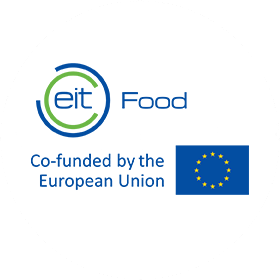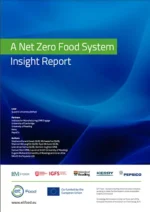Collaborating for impact:
A roadmap towards a sustainable,
healthy and resilient food system
EIT FOOD
Impact
Reports and recommendations that are shaping the strategy for the European food system
Informing the funding across projects related to EIT Food, an amount of €180 million over three years 2023–25
Fundamental changes to the way EIT Food funds projects, to be more open and collaborative, working with organisations as peers towards impact
Impact
Reports and recommendations that are shaping the strategy for the European food system
Informing the funding across projects related to EIT Food, an amount of €180 million over three years 2023–25
Fundamental changes to the way EIT Food funds projects, to be more open and collaborative, working with organisations as peers towards impact
In 2022 IfM Engage were selected to support EIT Food, the world’s largest and most dynamic food innovation community, in shaping the direction of their future strategy. Supported by the European Institute of Innovation and Technology (EIT), a body of the European Union, EIT Food is working to make the food system more sustainable, healthy and trusted. The strategy informs the allocation of funding across projects related to EIT Food, an amount of nearly €180 million over three years from 2023 – 25. This is the largest funding granted by EIT to one of its Knowledge and Innovation Communities, and will be used to help boost European innovation in the area of food.
EIT Food wanted to get a vision and consensus from across a significant number and diverse range of stakeholders from across Europe on how to make significant progress in three priority missions: Healthier Lives Through Food; A Net Zero Food System; and Reducing Risk for a Fair & Resilient Food System. IfM Engage provided strategy support in relation to the final two missions in collaboration with Queens University Belfast. *
Andrew Carlin, Director of Missions and Strategic Programmes at EIT Food, highlighted the range of insights they were looking to incorporate into their strategy: “we have hundreds of stakeholder organisations across Europe that we wanted to ensure were consulted and involved in how we are funding the future of food. We also wanted to make sure that we were utilising and building on existing insights from academic papers, case studies and subject matter experts.”
Roadmapping was seen by EIT Food as the right approach for this challenge. Roadmapping is a strategic planning technique used extensively across industry, government and academic organisations to bring clarity to complex problems and alignment of purpose.
“I always felt it was possible. The question was getting ourselves organised to do it. This is where the structure and the approach that IfM brought came in. I always felt that with the right forum and the right approach, we would be able to unlock that and move relatively quickly because the passion was there and the expertise was there,” says Andrew
“IfM’s very robust roadmapping methodology helped us to turn information into insight. We were able to sift and contextualise the mass of information out there to be able to grasp urgency and importance and the potential for societal impact. We were able to move from the wider picture to a narrower set of priorities and do that in a very structured way over the course of a couple of days.”
Andrew Carlin, Director of Missions & Strategic Programmes, EIT Food
Making sense of complexity
IfM’s roadmapping process helped transform the available data into a manageable number of potential projects and programmes that EIT Food could then put its footprint on. To facilitate this, over 100 people came together in a two-day roadmapping workshop in Paris.
Ahead of the workshops, IfM Engage and Queens University Belfast worked together with EIT Food to bring together insights from over 350 academic and industry publications, 250 questionnaires, 100 case studies and 70 in-depth expert interviews. This pre-work created insights and data that formed a robust foundation for discussions at the roadmapping workshops, as well as informing the associated reports.
Andrew says that IfM’s help and support in developing EIT’s thinking and approach to the project became most visible during the in-person workshops in Paris.
“IfM’s very robust roadmapping methodology helped us to turn information into insight. We were able to sift and contextualise the mass of information out there to be able to grasp urgency and importance and the potential for societal impact. We were able to move from the wider picture to a narrower set of priorities and do that in a very structured way over the course of a couple of days.”
One of the aspects of IfM’s Engage process that Andrew found particularly valuable was “the element of explicitly bringing choices into the strategy setting,” he says.
“You’re dealing with a very complex field. The issues can be so big that there’s almost a fear of saying ‘this is more important than that at this point in time’.”
The process created an environment where people could think about preferences and priorities for action. “We were able to move from ‘this is all too complex, we don’t know where to start,’ to ‘we have to start somewhere and these are the things we need to start with’,” says Andrew.
The case of regenerative agriculture
Andrew points to regenerative agriculture as an example of how the workshops created the right environment for discussions on how EIT Food can operate most effectively for its stakeholders. “For years farmers have been seen as being the central figures in driving change. The assumption has been that if the right training, or technology was offered, everything would change for the better.
The workshops gave farmers the opportunity to outline the reality on the ground and some of the barriers they are facing. If supermarkets are tying them into five-year production contracts, they simply don’t have the space to alter crops for regenerative agriculture. However, much they may want to make changes, circumstances prevent them.
It made us realise that our job is to build an ecosystem around farmers that makes the change as supported and as incentivized as possible. Supermarkets need to buy differently, banks have to fund differently, insurance companies have to change their policies.
Having farmers sitting in the room with somebody from a bank or a venture fund means that nobody can ignore what’s being talked about.
You get into the dialogue very, very quickly and we all learned a huge amount from having those voices in the room,” says Andrew.

Adding a layer of sophistication and understanding
As a result of the workshops, EIT Food now has a set of reports and recommendations that are shaping the strategy for the EU’s food system, not least when it comes to setting priorities for the allocation of funding.
“We have a new funding framework published in September 2023, which takes a needs-based approach for the first time and is fundamentally different from how we’ve done it before.” Andrew refers to this as being “technology agnostic”.
“It centres on the change and the societal impact we need to see and works backwards from there instead of the classic research funder model which starts from pushing the technology forward.
Once you perceive yourself as an impact funder rather than an R&D funder, you open different possibilities for answers being found in different places.
For example, you might look towards funding the development of existing technologies from other sectors into the food sector, cutting four or five years of development time so that people experience the benefit much quicker,” says Andrew.
Confidence and collaboration
The project has also allowed EIT Food to “make a much more confident kind of statement about our role,” says Andrew.
EIT Food is now “an organisation that believes in the power of open innovation and collaboration as the key to success, and is willing to say we’re comfortable enough in our skin not to insist on exclusivity. We’ve got an amazing community, an amazing network and actually we can bring the power of that to help other organisations. That’s been really important for us, and it’s allowed us to present a much more open face to the world,” says Andrew.
EIT Food is now working more closely with organisations that are explicitly engaged in the issues that they are trying to solve. “The process has meant we are now closer to the needs rather than to the technology, working with more NGOs and social enterprises. We’ve been able to stretch the boundaries of our own network to bring different perspectives in. That diversity is hugely important in innovation,” says Andrew.
As a result, they are seeing consortia building around some of the big issues highlighted in the reports such as optimising the nutritional value of food.
“We’ve allowed ourselves to admit some of these things are just really complex and actually you need an environment which supports complexity, working itself out. Instead of running away from it, we’re running towards it. We won’t solve everything, but if over time we’re resolving some of the issues then we’ll make more impact more quickly and at a greater scale,” explains Andrew.
Bringing complex issues to the people who need to take an interest in them
The reports have also given EIT Food the ability to bring complex issues to the people who need to take an interest in them at the political level “in a way which has a degree of scientific weight and a rigour behind it, but also presents the issues in an actionable way,” says Andrew.
“That’s something that’s really moved on a lot this year, particularly in the protein diversification side. We published a White Paper on that which has allowed us to begin a much deeper programme of advocacy and influencing,” says Andrew.

Embracing community
“We’ve become an organisation which is better able to welcome diverse and new perspectives on the big issues, but also translate that into funded or co-funded actions much more quickly. But also then connect that community to other communities globally and to also recognise the role of Europe and the global food system.
“The workshops were the spark that has taken that collaborative approach to the next level, bringing different characters and different capabilities of different networks together. That’s been something we’ve driven and built on in this last year,” says Andrew.
As a nod to this, EIT Food has joined the IfM’s Open Innovation Forum. The group aims to share best practice and explore hot topics and opportunities along the Food, Drink and Fast Moving Consumer Goods value streams.
Andrew noticed that there was a crossover in membership between EIT Food and the Open Innovation Forum which has enabled him to get wider insights into organisations that they already knew.
“We’re seeing it through the eyes of the people in those businesses who are driving the open innovation practices,” says Andrew. He has found it to be a non-competitive environment where people are comfortable discussing their failures as well as their successes. “It’s all driven by shared experience and shared learning. That’s supported us in building new and enriching existing relationships with our community,” says Andrew.
Final reflections
Andrew concludes:
“We’ve emerged significantly stronger as an organisation both in our sense of purpose and our ability to drive change. The process has led to a fundamentally different quality of attitude and behaviour which is more open and more collaborative, where we want to work with organisations as peers, not just be at the end of a funding process.”

“IfM’s very robust roadmapping methodology helped us to turn information into insight. We were able to sift and contextualise the mass of information out there to be able to grasp urgency and importance and the potential for societal impact. We were able to move from the wider picture to a narrower set of priorities and do that in a very structured way over the course of a couple of days.”
Andrew Carlin, Director of Missions & Strategic Programmes, EIT Food

“IfM’s very robust roadmapping methodology helped us to turn information into insight. We were able to sift and contextualise the mass of information out there to be able to grasp urgency and importance and the potential for societal impact. We were able to move from the wider picture to a narrower set of priorities and do that in a very structured way over the course of a couple of days.”
Andrew Carlin, Director of Missions & Strategic Programmes, EIT Food
IfM Engage supported the development of the strategy for two priority missions: A Net Zero Food System, Reducing Risk for a Fair and Resilient Food System.
* This work involved working in collaboration with Queens University Belfast to conduct extensive pre-work including facilitating surveys, research and interviews ahead of a two-day roadmapping workshop facilitated by IfM Engage.
If you are interested in how roadmapping can support your organisation, IfM Engage provides guides, insights, courses and consultancy services in this area.
About EIT Food
EIT Food is the world’s largest and most dynamic food innovation community. It accelerates innovation to build a future-fit food system that produces healthy and sustainable food for all.
Supported by the European Institute of Innovation and Technology (EIT), a body of the European Union, EIT Food invests in projects, organisations and individuals that share their goals for a healthy and sustainable food system.
RELATED RESOURCES
Roadmapping courses
We run a series of training courses in Cambridge and remotely, throughout the year, to support the transfer of roadmapping and related methods to individuals.
Roadmapping guide
Download the complete guide ‘An Introduction to Strategic and Technology Roadmaps’ where we share expertise and top tips to help you with your own roadmap.

